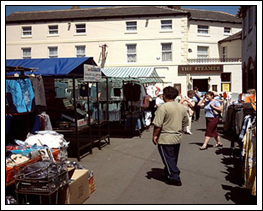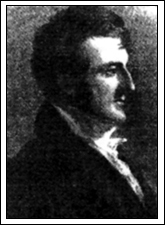For this week’s posting we’re navigating a minefield of legal difficulties; especially as far as the current owners of Fleetwood Market (shown below) might be concerned.

Nonetheless, because the subject matter is such an absorbing slice of local history, we’re going to continue anyhow. Let’s start with a quote from John Porter’s ‘History of the Fylde’ which reads: “On the first of January 1875, a number of gentlemen, denominated the Fleetwood Estate Company Ltd…purchased the lands, buildings, manorial rights and privileges (including wreckage, market-tolls, and advowson of the church) of the late Sir P. H. Fleetwood.”

None of which is particularly noteworthy even to the most un-knowledgeable of local historians…except that there’s a chance that Peter Hesketh Fleetwood (shown above) didn’t own the rights to Fleetwood at all! Quite a sweeping statement, we know, and one that explains our potential legal minefield. So what’s driven us to reach this inflammatory conclusion?
Well, the story begins in 1216 when, as the Victoria County History informs us: “King John, at the request of the Earl of Chester, bestowed (the Rossall estate) on the Abbey of Duelacres in Staffordshire and twelve years later Henry III confirmed the gift.”
The grange under Duelacres became prosperous and in 1253 King Henry granted Rossall its own market charter; a charter that Peter Hesketh would surely have had in his possession.
Obviously, there’s nothing problematic about that. But the World’s Fair newspaper of March 18th 1933 did raise an observation worthy of note: “It was not long after (Fleetwood) grew that a market was wanted, and the first market was opened November 7th 1840 which was the property of Sir Peter Hesketh Fleetwood. In 1842 under the Fleetwood Improvement Act, his rights were granted to hold a market for himself, heirs or assigns. As to whether he was empowered to hold a market without the authority of this act is a question which might have been open to debate. He owned, as Lord of the Manor, the market rights of a large area which included Fleetwood and which had been granted by King Henry III in 1253, but as these rights had never been exercised in Fleetwood he evidently decided to make his position sure.”
Following all this so far? Probably not because it’s a bit on the complicated side but, in a nutshell, if Peter Hesketh held the rights to the Rossall Estate, including the aforementioned market rights granted to Duelacres, then why did he need to apply for new ones?
Well, the complications in Rossall’s history arose around the time of the dissolution of the monasteries when an indenture, dated November 2nd 1533, was made between the Abbott of Duelacres and John Allen of Rossall. This indenture, in effect, leased the Duelacres’ lands at Rossall to John Allen. The fact that the Abbott also happened to be John Allen’s cousin smacks loudly of nepotism…but that’s going off at a tangent.
The real problems set in when the dissolution of the monasteries turned into the persecution of the Catholics during the reign of Elizabeth the First. Cardinal Allen, shown below, was a descendant of the John Allen to whom Duelacres had leased the Rossall Estate.

He was also a staunch Catholic who refused to kowtow to the queen’s Anglicanisation of the country. Instead he set up the English College at Douai in Belgium where priests were trained to enter Britain and ‘keep the faith alive.’ Understandably, he was high on Queen Elizabeth’s ‘Most Wanted’ list.
And so the inevitable happened. As William Thornber informs us in his ‘History of Blackpool’: “His (Richard Allen’s) widow and daughters were deprived of their property, which was confiscated in the year 1586; and £500 of the children’s money, on the charge that it was to be conveyed over to Dr. Allen at Rheims, was taken from one Annion, of Larkham, whose descendants continued resident at the Holmes till the beginning of the eighteenth century.”
Right…that probably sounded extremely complicated. It did to us the first time we read it because, even though Thornber was an excellent historian, he didn’t half waffle sometimes. To summarise then: Elizabeth Allen, Cardinal Allen’s sister-in-law, following the death of her husband Richard, was accused of aiding and abetting her brother-in-law, the infamous cardinal. Or, to be more specific, she was accused of laundering her daughters’ pocket money through somebody called Annion of Larkholme, in order to fund Cardinal Allen’s Catholic rebellion. Because of this the entire Rossall Estate was taken away from her and she was banished from Britain.
Back to Thornber for what happened next: “A suit was commenced by Mrs Allen to recover it, and a trial took place at Manchester; but according to the Romanist version of the story, she failed, on account of the original papers having been lost when Rossall Hall was plundered.”
In fact, according to other accounts, the papers weren’t so much ‘lost’ as ‘deliberately destroyed on a bonfire’ when the marshals ransacked Rossall Hall.
Interestingly, Edmund Fleetwood (from whom Peter Hesketh Fleetwood was, of course, descended) just happened to be foreman of the jury at Elizabeth Allen’s trial. Some years later, by another intriguing coincidence, he bought the Rossall Estate (without sitting tenants) for himself from the crown.
So…let’s rewind. If the Rossall Estate was gained by the Fleetwood family illegally (and, of course, it’s a very big ‘IF’) then Peter Hesketh’s heirs had no right to sell it to the Fleetwood Estate Company…and, seeing as ignorance is no excuse in the eyes of the law, then, if the above situation were true (and, again, we’d like to emphasise the word ‘if’) then the Fleetwood Estate Company wouldn’t legally own the rights either. In fact, if the missing lease was ever discovered, the descendants of the Allen family might well prove yet to hold the market rights, and they’d have an awful lot of back-rent coming to them.
All of this relies, of course, on the speculations we’ve just written about being proved correct which, to date, they haven’t been…and probably never will be.
And, on that legal disclaimer, it might be best to end this article.

Nonetheless, because the subject matter is such an absorbing slice of local history, we’re going to continue anyhow. Let’s start with a quote from John Porter’s ‘History of the Fylde’ which reads: “On the first of January 1875, a number of gentlemen, denominated the Fleetwood Estate Company Ltd…purchased the lands, buildings, manorial rights and privileges (including wreckage, market-tolls, and advowson of the church) of the late Sir P. H. Fleetwood.”

None of which is particularly noteworthy even to the most un-knowledgeable of local historians…except that there’s a chance that Peter Hesketh Fleetwood (shown above) didn’t own the rights to Fleetwood at all! Quite a sweeping statement, we know, and one that explains our potential legal minefield. So what’s driven us to reach this inflammatory conclusion?
Well, the story begins in 1216 when, as the Victoria County History informs us: “King John, at the request of the Earl of Chester, bestowed (the Rossall estate) on the Abbey of Duelacres in Staffordshire and twelve years later Henry III confirmed the gift.”
The grange under Duelacres became prosperous and in 1253 King Henry granted Rossall its own market charter; a charter that Peter Hesketh would surely have had in his possession.
Obviously, there’s nothing problematic about that. But the World’s Fair newspaper of March 18th 1933 did raise an observation worthy of note: “It was not long after (Fleetwood) grew that a market was wanted, and the first market was opened November 7th 1840 which was the property of Sir Peter Hesketh Fleetwood. In 1842 under the Fleetwood Improvement Act, his rights were granted to hold a market for himself, heirs or assigns. As to whether he was empowered to hold a market without the authority of this act is a question which might have been open to debate. He owned, as Lord of the Manor, the market rights of a large area which included Fleetwood and which had been granted by King Henry III in 1253, but as these rights had never been exercised in Fleetwood he evidently decided to make his position sure.”
Following all this so far? Probably not because it’s a bit on the complicated side but, in a nutshell, if Peter Hesketh held the rights to the Rossall Estate, including the aforementioned market rights granted to Duelacres, then why did he need to apply for new ones?
Well, the complications in Rossall’s history arose around the time of the dissolution of the monasteries when an indenture, dated November 2nd 1533, was made between the Abbott of Duelacres and John Allen of Rossall. This indenture, in effect, leased the Duelacres’ lands at Rossall to John Allen. The fact that the Abbott also happened to be John Allen’s cousin smacks loudly of nepotism…but that’s going off at a tangent.
The real problems set in when the dissolution of the monasteries turned into the persecution of the Catholics during the reign of Elizabeth the First. Cardinal Allen, shown below, was a descendant of the John Allen to whom Duelacres had leased the Rossall Estate.

He was also a staunch Catholic who refused to kowtow to the queen’s Anglicanisation of the country. Instead he set up the English College at Douai in Belgium where priests were trained to enter Britain and ‘keep the faith alive.’ Understandably, he was high on Queen Elizabeth’s ‘Most Wanted’ list.
And so the inevitable happened. As William Thornber informs us in his ‘History of Blackpool’: “His (Richard Allen’s) widow and daughters were deprived of their property, which was confiscated in the year 1586; and £500 of the children’s money, on the charge that it was to be conveyed over to Dr. Allen at Rheims, was taken from one Annion, of Larkham, whose descendants continued resident at the Holmes till the beginning of the eighteenth century.”
Right…that probably sounded extremely complicated. It did to us the first time we read it because, even though Thornber was an excellent historian, he didn’t half waffle sometimes. To summarise then: Elizabeth Allen, Cardinal Allen’s sister-in-law, following the death of her husband Richard, was accused of aiding and abetting her brother-in-law, the infamous cardinal. Or, to be more specific, she was accused of laundering her daughters’ pocket money through somebody called Annion of Larkholme, in order to fund Cardinal Allen’s Catholic rebellion. Because of this the entire Rossall Estate was taken away from her and she was banished from Britain.
Back to Thornber for what happened next: “A suit was commenced by Mrs Allen to recover it, and a trial took place at Manchester; but according to the Romanist version of the story, she failed, on account of the original papers having been lost when Rossall Hall was plundered.”
In fact, according to other accounts, the papers weren’t so much ‘lost’ as ‘deliberately destroyed on a bonfire’ when the marshals ransacked Rossall Hall.
Interestingly, Edmund Fleetwood (from whom Peter Hesketh Fleetwood was, of course, descended) just happened to be foreman of the jury at Elizabeth Allen’s trial. Some years later, by another intriguing coincidence, he bought the Rossall Estate (without sitting tenants) for himself from the crown.
So…let’s rewind. If the Rossall Estate was gained by the Fleetwood family illegally (and, of course, it’s a very big ‘IF’) then Peter Hesketh’s heirs had no right to sell it to the Fleetwood Estate Company…and, seeing as ignorance is no excuse in the eyes of the law, then, if the above situation were true (and, again, we’d like to emphasise the word ‘if’) then the Fleetwood Estate Company wouldn’t legally own the rights either. In fact, if the missing lease was ever discovered, the descendants of the Allen family might well prove yet to hold the market rights, and they’d have an awful lot of back-rent coming to them.
All of this relies, of course, on the speculations we’ve just written about being proved correct which, to date, they haven’t been…and probably never will be.
And, on that legal disclaimer, it might be best to end this article.



















2 comments:
1. was so pissed off about losing all that money, he became a US citizen in protest.
2. If any Fleetwoods had married into that fine SEDGWICK family from the banks of the Derwent, there would have been enough lead in the family pencil to repel all that larcenous mistreatment ... and they would have "made over $900 last month having fun!"
Yes...anonymous can make $900 having fun on somebody else's board, I reckon. Crystal...er...language please (unfortunately this isn't my old blogger board and I have to be careful with my reputation here...such as it is). Give my regards to Terence, will you, working on the assumption that you've found your way here through the venerable beard, of course.
Post a Comment